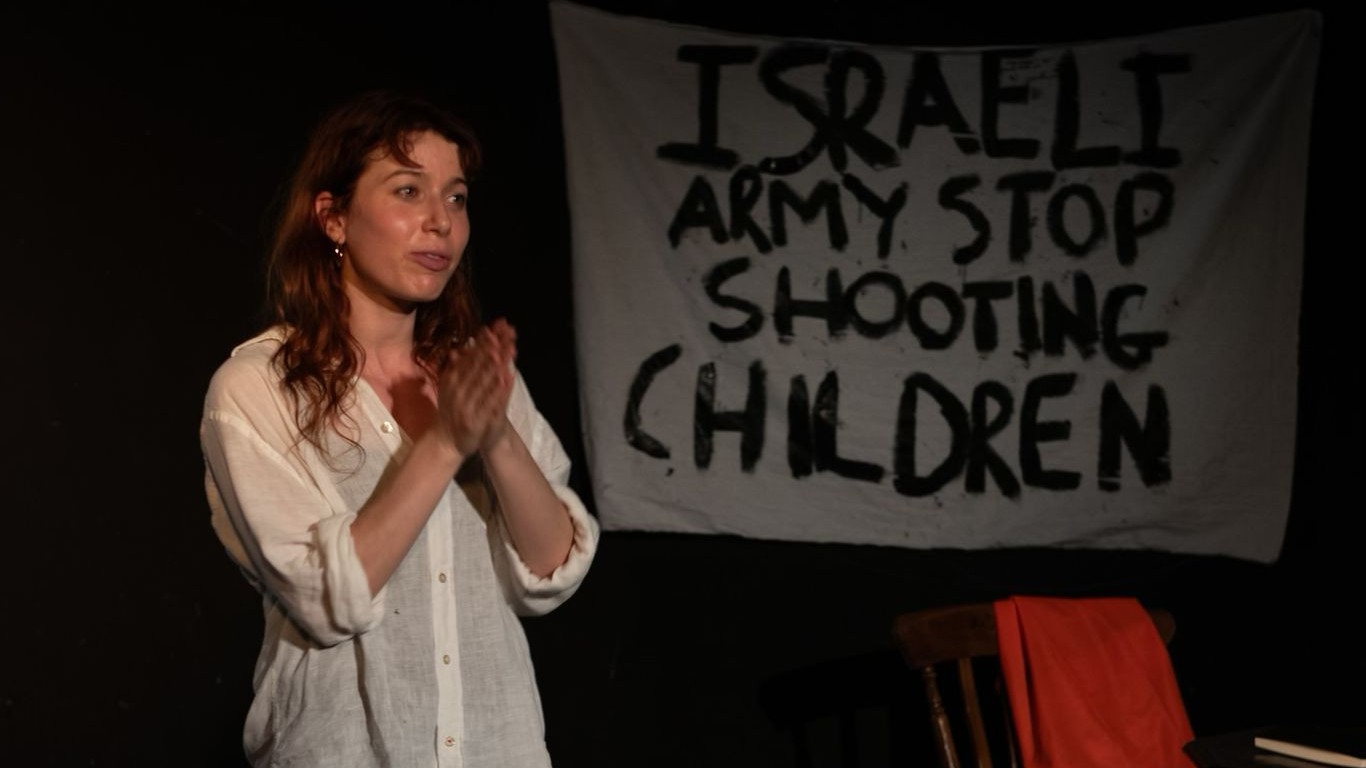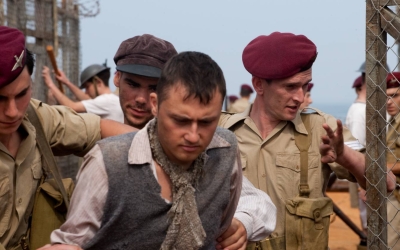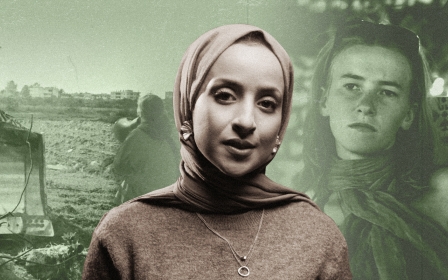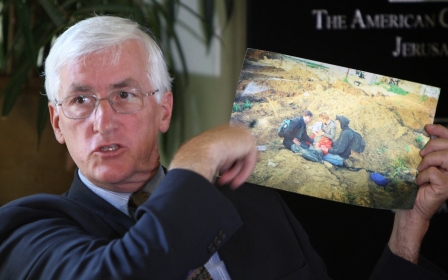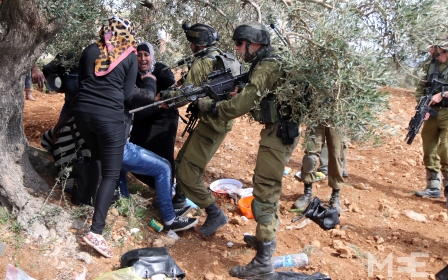Rachel Corrie and Gaza brought back to the London stage
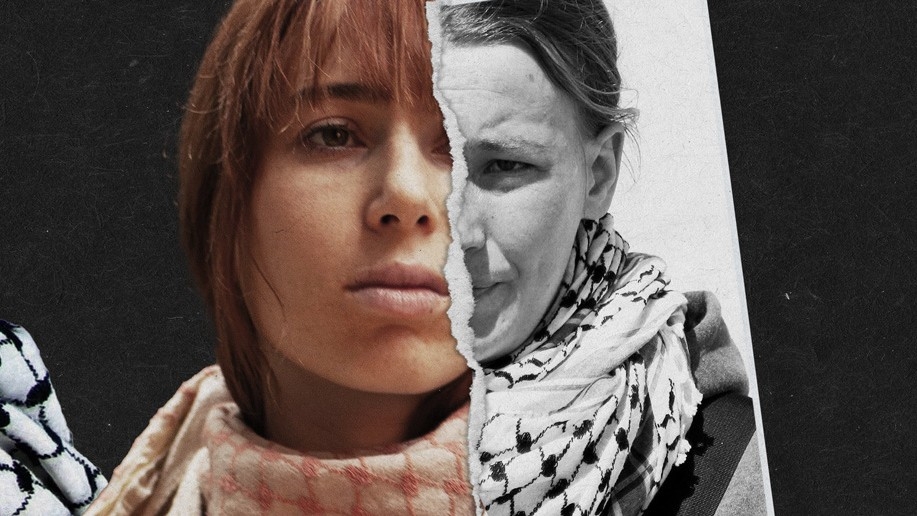
“I think it is a good idea for us all to drop everything and devote our lives to making this stop,” wrote American peace activist Rachel Corrie in 2003, after witnessing the situation in Rafah, the city on Gaza’s southern border.
Weeks later, she stood between an Israeli army bulldozer and the Palestinian homes it was trying to destroy. Corrie was crushed to death.
This week at the Old Red Lion theatre in the Angel, London, Jewish lead actor Sascha Shinder has been staging the play My Name is Rachel Corrie, along with a predominantly Jewish team.
The play was first performed in 2005, with a script taken from Corrie’s diaries and emails and edited by British acting legend Alan Rickman and journalist Katherine Viner, now the editor of the Guardian.
Shinder conceived the idea of restaging the play because reading about Corrie’s experiences helped facilitate her own understanding of what is now happening in Gaza.
New MEE newsletter: Jerusalem Dispatch
Sign up to get the latest insights and analysis on Israel-Palestine, alongside Turkey Unpacked and other MEE newsletters
This has been particularly acute since the Hamas-led attack of 7 October, and Israel’s ongoing war on the besieged enclave, which has now killed over 38,000 Palestinians.
“I was personally confused after 7 October,” Shinder told Middle East Eye. “I knew that I had a connection to Israel in a way I couldn’t understand, and I was hearing very different opinions from friends and family.”
When Shinder’s father read the script, he thought it was antisemitic and suggested that she shouldn’t put on the show – or should at least cut parts of it.
This prompted Shinder to look at it in minute detail. She went through the script and concluded that she had a different view to her father: it wasn’t antisemitic.
“It was a blessing that my dad posed the question because I really have to make up my own opinion in relation to my Jewish identity,” she said.
Shinder said there were quite a few Zionist people in the audience who usually would not have come to see the play but did because they knew the team was mostly Jewish. It allowed them to lower their guard, she said.
The play’s director Sophia Rosen-Fouladi is half-Jewish and half-Iranian herself.
“The way our background affected us was quite small and subconscious,” Rosen-Fouladi told MEE.
The director said the predominantly Jewish makeup of the team came from a desire to centre the simple cry for humanity found in Corrie’s voice, rather than a debate between Corrie’s voice and a “Jewish voice”.
From a US college to Gaza
The play opens with Corrie as a fiery college student in Olympia, Washington, in the Pacific northwest of the US. A self-proclaimed wanderer with a nomadic soul, Corrie writes about clouds and boyfriends, about the mundane details of her life.
A sense of purpose compelled Corrie to volunteer in Gaza, where she continued to record the humanity of Gazans - from a grandmother who lectured her on the dangers of smoking to a family watching Tom and Jerry.
All of this is juxtaposed with descriptions of constant shelling and Israel’s tight military control, of greenhouses destroyed and people searching for water being shot at.
Corrie wrote: “Just feel sick to my stomach a lot from being doted on all the time, very sweetly, by people who are facing doom.”
Twenty years after the second intifada (2000-2005), Corrie’s words were brought back to life at a time of ongoing humanitarian crisis in Rafah, where much of the play is set.
“What is now happening in Gaza not only adds power to the play, but makes it even more important for her words to be said and heard,” Rosen-Fouladi said.
“[Corrie] is in many ways just an ordinary woman that we can relate to, and she had so much conviction to go [into Gaza] and enact change,” the director continued. “These words are quite galvanising and inspiring for finding within ourselves our humanity to help.”
For Shinder, portraying Corrie was more of an “embodied experience” that did not involve actively thinking about the context. But the actor’s acute awareness of current events was what drove her to stage the play.
Inside the theatre, the horror of Gaza at the turn of the century is brought to life. Outside, tens of thousands of people regularly fill London’s streets in protest at what is happening now.
Shinder’s final monologue is a call to action. For her, the role of an artist is to “connect people through their humanity.”
Indeed, several audience members attended the show wearing keffiyehs. And with company profit from ticket sales going to the family of Ahmed Masoud in Gaza - Masoud’s brother was killed in an Israeli air strike and his family’s home has been destroyed - this connection is going all the way back to Palestine.
Middle East Eye delivers independent and unrivalled coverage and analysis of the Middle East, North Africa and beyond. To learn more about republishing this content and the associated fees, please fill out this form. More about MEE can be found here.


